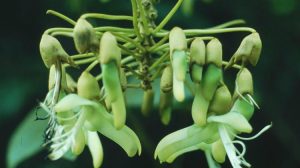15

Mucuna Pruriens
Mucuna pruriens is a tropical legume in the Fabaceae family that is native to Asia and Africa where it grows wild. English names for mucuna include velvet bean, cowage, cowitch, and Lyon bean.
Mucuna is a shrub with long vines, pointy leaves, and white, purple, or lavender flowers. Its seed pods are around four inches long, and contain up to seven black or brown seeds, also called beans.
The plant, and particularly the seeds, have long been used in Ayurvedic medicine to treat anxiety, arthritis, snake bites, scorpion stings, and Parkinson’s disease. The shoots and beans can both be cooked and eaten. And the beans are sometimes used as a coffee substitute, which sounds like something resembling blasphemy.
What makes mucuna pruriens special is its high levels of the amino acid L-DOPA, a precursor to dopamine. L-DOPA is converted to dopamine in the brain through a process called decarboxylation. People suffering from Parkinson’s disease have low levels of this hormone, which is why mucuna is used to treat the disease. L-DOPA is also a precursor to other hormones like norepinephrine, serotonin, melatonin, and HGH (human growth hormone).
Mucuna Pruriens Benefits
Mucuna pruriens isn’t just a good source of L-DOPA, it’s the highest natural source of it. And as stated above, it leads to the production of dopamine – a neurotransmitter that helps our bodies better handle stress. Dopamine is essential for emotional health, cognitive function, muscle coordination, and motor skills.
Dopamine is depleted by stimulants (including nicotine and caffeine), alcohol, and stress, which means most of us could probably use more of it. If you ever feel restless and jittery, you can bet you need more dopamine.
Mucuna pruriens is also rich in tryptophan, an amino acid that helps our bodies produce serotonin, a neurotransmitter that regulates mood, sleep, and appetite. It’s also known for having antidepressant and cognitive qualities, including the enhancement of learning and memory.
Mucuna has a long history in Ayurvedic medicine as being an aphrodisiac. It’s also been known to promote fertility in men and women, increase sperm count, regulate ovulation cycles, and enhance the production of hormones like testosterone and HGH.
A 2009 study, involving 75 men suffering from infertility issues, examined mucuna pruriens effect on male fertility and found that it significantly improved levels of dopamine, sperm count, and testosterone.[77] There have also been countless studies done on mucuna’s effect on sexual behavior that are promising.
One study conducted on healthy rats found that a mucuna supplement “significantly increased the mounting frequency, intromission frequency and ejaculation latency.“[78] Another done on diabetic rats (as sexual problems are often a complication of the disease) found similar results, including “significant improvement in sexual behavior, libido and potency, and sperm parameters.“[79]
Besides treating sexual dysfunction, mucuna pruriens benefits also include …
- Promotion of restful sleep
- Treatment for Parkinson’s disease
- Relief from stress and anxiety
- Improved memory and brain health
- Restoration of kidney and adrenal functions
- Reduction in addictive cravings
- Neurological benefits
- Mood improvement
- Calming effect on the nervous system
Many of these benefits are dopamine related, along with the production of hormones like serotonin and melatonin. However, the HGH production capabilities of mucuna cannot be overstated. HGH is primarily produced by the pituitary gland, however after the age of 50 our bodies produce very little of it, or even none at all.
Considering HGH’s impact on vitality and longevity, anything that we can do to promote the production of more it (by natural means) is extremely beneficial. HGH can help increase exercise capacity, bone density and muscle mass, while also decreasing body fat. Some people have even gone so far as to declare it the biological equivalent to a fountain of youth.
There are other ways to increase HGH (again, naturally), including high intensity interval training. To learn more about this powerful approach to exercise, also known as Peak 8, read this extremely detailed article by Dr. Joseph Mercola.
Mucuna pruriens’ impact on Parkinson’s disease has been studied at length. In fact, you can now get straight L-DOPA as a prescription drug. However, studies have shown that maybe that’s not such a good idea. This 2012 study found that “a whole extract of M. pruriens seeds could be superior to pure L-dopa with regard to the treatment of Parkinson’s.”[80] They also concluded that synthetic L-DOPA often presents complications after several years of use.
Another study on mucuna’s effect on Parkinson’s came to the same conclusion.[81] Researchers stated that mucuna had “shown anti-Parkinson and neuroprotective effects in animal models of Parkinson’s disease that is superior to synthetic Levodopa (L-DOPA).” Mother Nature cannot be outsmarted, which is why the best approach will always be the most natural.
And since depression is so pervasive in our modern world, I’ll leave you with one last study, in which an “extract of MPE (mucuna pruriens seeds) produced a specific antidepressant-like effect in acute and chronic models of depression.“[82]
Mucuna Pruriens Uses
I recommend purchasing a quality mucuna pruriens powder containing at least 15% L-DOPA. You can add the powder to beverages like fruit and vegetable juices, water, and smoothies. It mixes particularly well with cacao. Check out this Navitas Naturals page with numerous smoothie recipes that contain raw cacao. A half to full teaspoon of mucuna powder seems to be an average dose, and should be a nice addition to any of those smoothies.
But as always, start out with a small dose and see how your body reacts. We all respond to superfoods differently. If interested in trying mucuna, check out Lost Empire Herb’s organic full spectrum extract containing 15.76% L-DOPA.
Check out this video to hear Dr. Bob McCauley’s thoughts on mucuna pruriens. He’s a big fan of this powerful superfood, and he’ll tell you why. Something to do with HGH and longevity. Unless you don’t want to live a longer, healthier life. But that would be silly.
